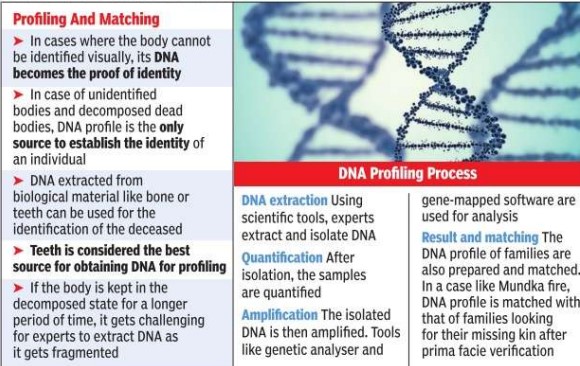News Highlights
Delhi Police employing DNA profiling to find missing relatives of people who fall victims Mundka Fire
What is DNA ?
- DNA (deoxyribonucleic acid) is the most basic genetic material found in the body cells of all human beings.
- It’s a chain of chemical compounds that join together to form permanent blueprints for life.
- It determines the behaviour, human and body character of an individual.
- It is basically a hereditary material in humans that no two people (besides identical twins) share.
DNA Profiling Technology
- DNA profiling is the process where a specific DNA pattern, called a profile, is obtained from a person or sample of bodily tissue
- Even though we are all unique, most of our DNA is actually identical to other people’s DNA.
- However, specific regions vary highly between people. These regions are called polymorphic.
DNA Profiling is used to
- Identify the probable origin of a body fluid sample associated with a crime or crime scene
- Reveal family relationships
- Identify disaster victims
DNA Profiling Process

Issues with DNA Profiling
- Privacy issue: Sensitive genetic information of a person is exposed to another individual and it is against human rights
- Security concerns – DNA databases holding DNA profiles
- Lack of expertise – Leads to mishandling of samples
- Intermixing of samples – Corruption, tampering with evidence, misconception during labeling sample is possible
- Unreliable results – Instrumental errors also lead to unreliable results
- Prolonged contact to sunlight humidity mar leads to degradation of sample
| DNA Technology (Use and Application) Regulation Bill, 2019 Timeline 2019: The DNA Technology (Use and Application) Regulation Bill, 2019 was set in motion and passed in the lower house,however it expired even before it could be presented before the upper house July 2019: reintroduced and is now pending in the Lok Sabha as it has been referred to the Parliamentary Standing Committee. Feb03 2021: Report submitted by standing committee Purpose of the Bill The Bill provides for the regulation of use of DNA technology for establishing the identity of certain persons. Positive Aspects of the Bill #Compostition of Regulatory Body: In addition to scientific or forensic field person , those who represent human rights groups (NHRC) investigating agencies (NIAgency) who are directly involved in investigating crime scenes are also part of regulatory body #No Unnecessary Profile saving:Bill ensures that no unnecessary DNA profiles are kept in the databank especially of those people who are neither a suspect nor an undertrial or an offender. #Privacy provisions: Bill puts an obligation on the Board to adopt practices concerning collection of samples which do not infringe the right to privacy of individuals and are collected keeping in mind all ethical and human rights issues, including international guidelines by UN, relating to DNA testing. Negative aspects of the Bill #The Bill has raised many questions related to rights of privacy to citizens and rightly so as there is no law in our country which prescribes any protection from the leak of data. #There are no specific penalties levied on the authority (national/regional DNA databank) in case of breach of such data. The larger authority is not made directly liable in cases of mishandling. #Vulnerable to abuse in terms of planting, manipulation or mishandling of evidence both at the collection and examination level. There are many technical lacunas which lead to tampering of the evidences. #Section 57 of the Bill[33]completely ousts the jurisdiction of the court in respect of any matter which is to be determined by the Board #The Bill has given a lot of power in the hands of the Government to make recommendations and issue directions to the Board to the extent that its decision shall always prevail in case of conflict between the Government and the Board. |
Way Forward
- The DNA Technology (Use and Application) Regulation Bill introduced by the Government can be seen as a positive step towards legitimising DNA profiling; however, it is not free of concerns raised by the Parliamentary Standing Committee on Science and Technology, Environment and Forests after an examination.
- The Government of India must enact the Data Protection Bill before getting any new legislation which is likely to breach individual privacy. This law will provide recourse to people whose rights are violated.
Pic Courtesy: India Today
News Source: The Hindu



